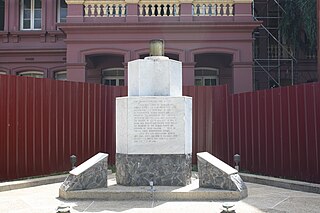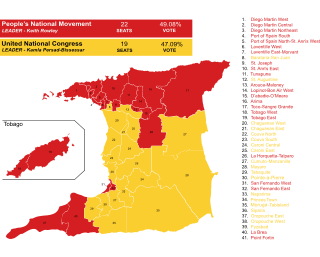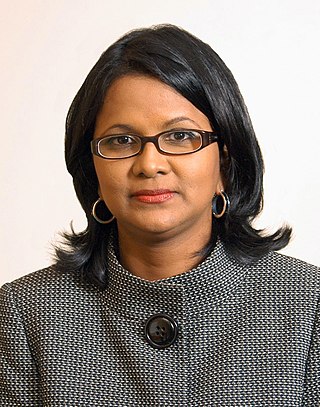Related Research Articles
The history of Trinidad and Tobago begins with the settlements of the islands by Indigenous First Peoples. Trinidad was visited by Christopher Columbus on his third voyage in 1498,, and claimed in the name of Spain. Trinidad was administered by Spanish hands until 1797, but it was largely settled by French colonists. Tobago changed hands between the British, French, Dutch, and Courlanders, but eventually ended up in British hands following the second Treaty of Paris (1814). In 1889, the two islands were incorporated into a single political entity. Trinidad and Tobago obtained its independence from the British Empire in 1962 and became a republic in 1976.

The politics of Trinidad and Tobago function within the framework of a unitary state regulated by a parliamentary democracy modelled on that of the United Kingdom of Great Britain and Northern Ireland, from which the country gained its independence in 1962. Under the 1976 republican Constitution, the monarch was replaced as head of state by a President chosen by an electoral college composed of the members of the bicameral Parliament, consisting of the Senate and the House of Representatives.
Trinidad and Tobago, a country that relies heavily on industrialisation and tourism, has various transport systems.

Eric Eustace Williams was a Trinidad and Tobago politician who is regarded by some as the "Father of the Nation", having led the then British Colony of Trinidad and Tobago to majority rule on 28 October 1956, to independence on 31 August 1962, and republic status on 1 August 1976, leading an unbroken string of general elections victories with his political party, the People's National Movement, until his death in 1981. He was the first Prime Minister of Trinidad and Tobago and also a noted Caribbean historian, especially for his book entitled Capitalism and Slavery.

Patrick Augustus Mervyn Manning was a Trinidadian politician who was the fourth Prime Minister of Trinidad and Tobago; his terms ran from 17 December 1991 to 9 November 1995 and from 24 December 2001 to 26 May 2010. He was also Political Leader of the People's National Movement (PNM) from 1987 to 2010. A geologist by training, Manning served as Member of Parliament for the San Fernando East constituency from 1971 until 2015 when he was replaced by Randall Mitchell and was the longest-serving member of the House of Representatives. He was the Leader of the Opposition from 1986 to 1990 and again from 1995 to 2001.

The United National Congress is one of two major political parties in Trinidad and Tobago and the current parliamentary opposition. The UNC is a centre-left party. It was founded in 1989 by Basdeo Panday, a Trinidadian lawyer, economist, trade unionist, and actor after a split in the ruling National Alliance for Reconstruction (NAR). After spending six years in opposition, the UNC won control of the government in 1995, initially in coalition with the NAR and later on its own. In the 2000 general election, the UNC won an absolute majority in the Parliament. In 2001, a split in the party caused the UNC to lose its parliamentary majority and control of the government. From 2001 to 2010, the UNC was once again Parliamentary Opposition party. In May 2010, the UNC returned to government as the majority party in the People's Partnership. The UNC's Political Leader, Kamla Persad-Bissessar, was sworn in as the first female Prime Minister of Trinidad and Tobago. Kamla Persad-Bissessar was Prime Minister from 2010 until 2015.

The People's National Movement (PNM) is the longest-serving and oldest active political party in Trinidad and Tobago. The party has dominated national and local politics for much of Trinidad and Tobago's history, contesting all elections since 1956 serving as the nation's governing party or on four occasions, the main opposition. As a result, it has sometimes been referred to as Trinidad and Tobago's "main political party". There have been four PNM Prime Ministers and multiple ministries. The party espouses the principles of liberalism and generally sits at the centre to centre-left of the political spectrum.

The Jamaat al Muslimeen coup d'état attempt was an attempt to overthrow the government of Trinidad and Tobago, instigated on Friday, 27 July 1990. Over the course of six days, Jamaat al Muslimeen, a radical extremist Islamist group, held hostages at the Red House and at the headquarters of the state-owned national television broadcaster, Trinidad and Tobago Television (TTT). On 1 August, the insurgents surrendered. They were charged with treason, but were ordered released by the Court of Appeal. Twenty four people were killed and many more were injured in the coup.
Eric A. Williams was a Trinidad and Tobago politician until November 2007 and was Member of Parliament for Port of Spain South. Until his resignation from the Cabinet in January 2006, he served as the Minister of Energy and Energy Industries in the then People's National Movement government, a post he had held since December 2001. A geologist and geophysicist by training, Williams entered Parliament in 1995 when he won the Port of Spain South seat formerly held by PNM founder Dr. Eric Williams.

The Congress of the People (COP) is a political party in Trinidad and Tobago. Its current political leader is Kirt Sinnette. Its symbol is the "Circle of Circles".
Linda Baboolal was a Trinidad and Tobago politician and physician who served as the first female President of the Senate of Trinidad and Tobago (2002–2007). She was also Minister of Social Development and Minister of Health, and the first female chairperson of the People's National Movement (PNM).
The National Petroleum Marketing Company, better known by its brand name National Petroleum (NP), is a state-owned refined petroleum distribution and marketing company owned by the government of Trinidad and Tobago. From its inception in 1972 until 1999, NP was the sole government-authorized distributor of gasoline, diesel fuel, and other consumer refined petroleum products in the island nation. The company has since expanded into lubricants, liquified petroleum gas, aviation fuel, and bunker fuel.

General elections were held in Trinidad and Tobago on Monday, 10 August 2020, to elect 41 members to the 12th Trinidad and Tobago Republican Parliament. It was the 14th election since gaining independence from the United Kingdom in 1962 and the 22nd national election in Trinidad and Tobago ever. Tracy Davidson-Celestine, political leader of the Tobago Council of the People's National Movement (PNM) became the first woman to lead a Tobagonian political party with representation in the House of Representatives. Additionally, two of the three largest parties elected in 2015, the United National Congress (UNC) and the Congress of the People (COP), were led by women.

House of Assembly elections were held in Tobago on 25 January 2021 where 12 members were elected in the eleventh election since the Assembly was established in 1980. This election marked the first time in history that both parties elected, the People's National Movement (PNM) and Progressive Democratic Patriots (PDP) won an equal number seats of 6-6, despite the PNM winning the popular vote, resulting in a deadlock and a constitutional crisis with both political parties and Prime Minister Keith Rowley seeking senior counsel advice on the way forward. This election was the first time after 20 years in power that the PNM lost its absolute majority. This election also marked the first time a female political leader was elected to the Assembly and the first time a woman led a major political party or a political party with representation in the Assembly, following the 2020 Tobago Council of the People's National Movement leadership election where Health Secretary, councillor and former Trinidad and Tobago Ambassador to Costa Rica and former Deputy Chief Secretary of Tobago Tracy Davidson-Celestine made history by being elected as the PNM's first female political leader at the regional or national level and one of the first bilingual political leaders in the country's history. If Davidson-Celestine and the PNM were to be elected with a majority to their sixth consecutive term in office, she would have made history, becoming the first female Chief Secretary of Tobago. The election was held alongside local by-elections in Trinidad in which the PNM and UNC retained two districts and the PNM losing one to the UNC.

Stuart Richard Young is a Trinidad and Tobago politician and attorney, representing the People's National Movement (PNM). He has served as a Member of Parliament in the House of Representatives for Port-of-Spain North/St. Ann's West since the 2015 general election. He is the current Minister of Energy and Energy Industries and Minister in the Office of the Prime Minister. Young has previously held the posts of Minister of National Security, Minister in the Ministry of the Attorney General and Legal Affairs and Minister of Communications.

Snap House of Assembly elections were held in Tobago on 6 December 2021 to elect all 15 members of the Tobago House of Assembly (THA). The election was called following a deadlock created by the January 2021 elections which resulted in a tie between the People's National Movement (PNM) and the Progressive Democratic Patriots (PDP), with both parties winning six seats. As a result, the number of seats in the legislature was increased from 12 to 15 to avoid ties.

Indirect presidential elections were held in Trinidad and Tobago on 20 January 2023.

Faith Brebnor Yisrael is a Tobagonian public health official and politician who has served in the Tobago House of Assembly since 2017. Initially an appointed member of the body, she was elected in January 2021 as a member of the Progressive Democratic Patriots, though she left the party in December 2022 following disagreements with leader Watson Duke.
References
- 1 2 3 4 5 6 7 8 9 10 DeVertieul, Anthony (1981). The Story of Gene Smiles and the Gas Station Racket. Port of Spain: Paria Publishing Co. Ltd. p. 49.
- ↑ Hook to the Commission of Enquiry section.
- 1 2 3 4 5 6 Government of Trinidad and Tobago (1967). Report of the Commission of Enquiry into the Circumstances Surrounding the Sales, Leases and Other Transfers of Gasolene Stations or Sites for Gasolene Stations since 1961 and the Procedure Followed in the Granting of Licenses for the Operation of Such Stations. Port of Spain: Government of Trinidad and Tobago. p. 9.
- ↑ Ferreira, Ferdie (15 October 2012). "I Beg to Disagree". Trinidad and Tobago Newsday.
- ↑ Mathur, Ira (23 March 2014). "Have Women Come a Long Way in TT?". Ira's Room (blog). Retrieved 7 May 2018.
- 1 2 3 4 5 Johnson Washington, Clare (2010). "Women and Resistance in the African Diaspora, with Special Focus on the Caribbean (Trinidad and Tobago) and U.S.A". (M.Sc. thesis). Portland: Portland State University. p. 51.
- ↑ "Miss Miles makes mas on stage again".
- ↑ Julien, Joel (18 June 2017). "Ferdie's Behind-the-Scenes Account of PNM Politics". Trinidad and Tobago Guardian. Archived from the original on 23 August 2017. Retrieved 7 May 2018.
- ↑ Hall, Tony (10 November 2011). Gene Miles: the Woman of the World. Little Carib Theatre: Port of Spain: (performance).
- ↑ Hilton, Anne (10 November 2011). "Salazar Triumphs as 'Miss Miles'". Trinidad and Tobago Newsday. Retrieved 7 May 2018.
- ↑ Gibbings, Wesley (14 December 2017). "Gene Miles and Theatrical Realism". Trinidad and Tobago Guardian. Retrieved 7 May 2018.
- ↑ Ragoonath, Bishnu (2014). The failure of the Abu Bakr Coup: Plural Society, Cultural Traditions and Political Development in Trinidad. In A. Payne & P. Sutton (Eds.) Size and Survival: The Politics of Security in the Caribbean and the Pacific. London: Routledge. p. 35.
- ↑ Government of the Republic of Trinidad and Tobago (2010). Report of the Commission of Enquiry to Enquire into the Events Surrounding the Attempted Coup Which Occurred in the Republic of Trinidad and Tobago on 27th July, 1990. Port of Spain: Government of the Republic of Trinidad and Tobago.